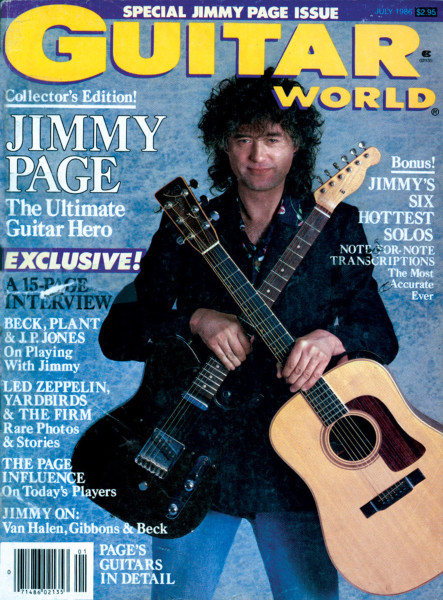Quick: Which Rolling Stones Hit Features Jimmy Page on Lead Guitar?
If you've ever wondered how it would sound if Jimmy Page were in the Rolling Stones in the mid Eighties, you've just stumbled upon the answer. "One Hit (to the Body)," a Top 40 Rolling Stones hit from 1986, features the Led Zeppelin co-founder on lead guitar.
The song's Russell Mulcahy-directed music video, above, shows Keith Richards skulking around an industrial, Mad Max-style warehouse with a double-bound Fender Tele during the guitar solo (2:27). Well, at least they got the guitar right—Page (who is not shown at all in the clip) is obviously playing his B-bender-equipped Tele—the one he's holding on the cover of the July 1986 issue of Guitar World magazine (shown below). Page was using his B-bender a lot back then; it's heard on his mid-Eighties recordings with the Firm and the Honeydrippers, not to mention Led Zeppelin's In Through the Out Door.
"I installed StringBenders in two of Jimmy Page's guitars—one in a Tele and one in a Les Paul," Gene Parsons, creator/designer of the Parsons/White StringBender, told me last month. "I think he always appreciated [Byrds guitarist and B-bender pioneer] Clarence White and might have even been a fan. It must have been that ‘Clarence sound’ that convinced him to have the StringBenders installed."
Anyway, why did this unlikely recording session even happen? Good question! Page was close to the Stones—geographically speaking—right around the time of Live Aid in July 1985. His guitar contribution was the result of a brief session with Ronnie Wood after Page asked to hear what the band was working on. The song, which reached Number 38 on the U.S. charts, was featured on the Stones' 1986 album, Dirty Work, which sold an impressive 4 million copies worldwide.
As any good Stones fan knows, "One Hit (to the Body)" wasn't the first time Page recorded with (or for) the band. Page, who was a full-time session guitarist before joining the Yardbirds in 1966, appears on an early—and unused—version of "Heart of Stone," which was recorded in July 1964 (with drummer Clem Cattini sitting in for Charlie Watts). The recording, which you can hear above, represents an early stab at blending country with R&B; it was recorded a full four years before the Byrds' country version of William Bell's "You Don't Miss Your Water." It eventually appeared on Metamorphosis in 1975.
By the way, Wood and Richards also play guitar on "One Hit (to the Body)"; that's Wood playing the acoustic intro. The song is even credited to Mick Jagger, Richards and Wood—a rarity.
And what about all those fake punches and nasty looks between Jagger and Richards in the music video? Well, that's an example of art imitating life; the duo weren't really getting along at the time (something to do with Jagger deciding to launch a solo career—and releasing She's the Boss in 1985; incidentally, She's the Boss features Page's Yardbirds buddy, Jeff Beck, on guitar).
Get The Pick Newsletter
All the latest guitar news, interviews, lessons, reviews, deals and more, direct to your inbox!
Anyway, I hope you've enjoyed this blast from the past. There will be more...

Jimmy Page performance photo (GuitarWorld.com homepage): Clive Rose/Getty Images

Damian is Editor-in-Chief of Guitar World magazine. In past lives, he was GW’s managing editor and online managing editor. He's written liner notes for major-label releases, including Stevie Ray Vaughan's 'The Complete Epic Recordings Collection' (Sony Legacy) and has interviewed everyone from Yngwie Malmsteen to Kevin Bacon (with a few memorable Eric Clapton chats thrown into the mix). Damian, a former member of Brooklyn's The Gas House Gorillas, was the sole guitarist in Mister Neutron, a trio that toured the U.S. and released three albums. He now plays in two NYC-area bands.
“His songs are timeless, you can’t tell if they were written in the 1400s or now”: Michael Hurley, guitarist and singer/songwriter known as the ‘Godfather of freak folk,’ dies at 83
“The future is pretty bright”: Norman's Rare Guitars has unearthed another future blues great – and the 15-year-old guitar star has already jammed with Michael Lemmo









